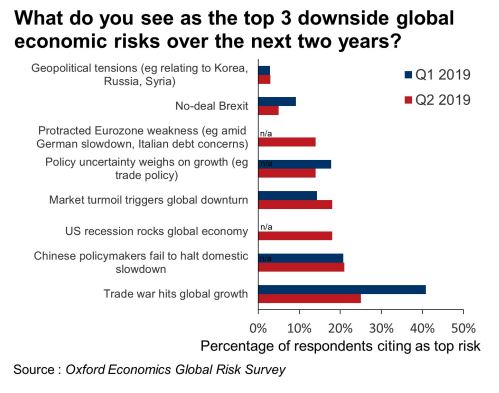How are you sleeping lately?
Some Americans are feeling uneasy. Consumer confidence fell to a two-year low in June, the Conference Board announced this week. It fell to 121.5 this month from a 131.3 in May. That’s the lowest level since September 2017.
“The escalation in trade and tariff tensions earlier this month appears to have shaken consumers’ confidence,” Lynn Franco, senior director at the Conference Board, said in a statement. Continued uncertainty could “diminish” people’s confidence in the economic expansion, she added.
Many people are living with wildly fluctuating income, a recent report from the Board of Governors of the Federal Reserve System said. “Volatile income and low savings can turn common experiences — such as waiting a few days for a bank deposit to be available — into a problem.”
Despite unemployment hitting a 49-year low, plus low interest rates and inflation, people are feeling skittish. “A major trade war between the U.S. and China represents our greatest economic risk,” according to Lynn Reaser, chief economist of the Controller’s Council of Economic Advisors.
Despite unemployment hitting a 49-year low, plus low interest rates and inflation, people are feeling skittish.
All of these worries are taking their toll. 78% of adults are losing sleep over work, relationships, retirement and other worries, according to a study released Thursday by personal-finance site Bankrate.com. Over half (56%) of Americans are lying awake at night worrying about money.
People are tossing and turning over retirement (24%), health care and/or insurance bills (22%), the ability to pay credit-card debt (18%), mortgage/rent payments (18%), educational expenses (11% versus 26%) and stock-market volatility (5%). The site polled over 2,500 people.
Also see: Scarred by the Great Recession, Americans see storm clouds on the horizon
Other indicators that people are feeling under pressure: Nearly half — 45% — of U.S. workers require a side hustle to make ends meet, and even middle-aged workers are feeling the pinch. This includes 48% of millennials, 39% of Generation Xers and 28% baby boomers.
The good news: A higher number of U.S. adults were losing sleep over money three years ago.
Another reason why people may be feeling financially insecure, despite a strong economy: After showing signs of an upswing earlier this year, wage growth disappointed in May. Wages increased just 3.1% on the year in May, not including inflation, slowing from 31.% the previous month.
All of these worries are taking their toll. 78% of adults are losing sleep over work, relationships, retirement and other worries, according to a study released Thursday by personal-finance site Bankrate.com. Over half (56%) of Americans are lying awake at night worrying about money.
People are tossing and turning over retirement (24%), health care and/or insurance bills (22%), the ability to pay credit-card debt (18%), mortgage/rent payments (18%), educational expenses (11% versus 26%) and stock-market volatility (5%). The site polled over 2,500 people.
After a decade-long economic expansion and stock market growth, they say it’s only a matter of time before there’s another downturn. Oxford Economics, a U.K.-based forecasting firm, predicts that fallout from the next recession could trigger a 30% drop in the S&P 500 SPX, +0.46%

Don’t miss: Is your boss a psychopath?
The good news: A higher number of U.S. adults (62%) were losing sleep over money three years ago, and lying awake over retirement (39%), health care and/or insurance bills (29%), mortgage/rent payments (26%), educational expenses (11%) and stock-market volatility (5%).
“When you’re wrestling with a big issue, it’s important to break it into manageable chunks,” said Ted Rossman, an analyst at Bankrate. Making a plan will help settle a restless mind, he said. “That holds true whether you’re worried about health, money, relationships, work or anything else.”
People who slept for longer than the usual 6 to 8 hours a day had an increased risk of cardiovascular disease.
The amount of time you sleep is also linked to your risk of developing cardiovascular disease and early morbidity, according to a study of over 116,000 people in seven regions of the world, published in the peer-reviewed European Heart Journal in May.
This conclusion appeared to contradict a slew of studies suggesting people should always get more, not less, sleep. They found that people who slept for longer than the usual 6 to 8 hours a day had an increased risk of dying or developing diseases of the heart or blood vessels in the brain.
Compared to those who slept for the recommended time, people who slept 8 to 9 hours a day had a 5% increased risk of those ailments and early death. while those sleeping between 9 and 10 hours a day had an increased risk of 17% and people sleeping 10 hours a day or more had a 41% higher risk.
That study looked at 116,632 adults aged between 35 and 70 years in 21 countries with different income levels in 7 geographic regions (North America and Europe, South America, the Middle East, South Asia, Southeast Asia, China and Africa). They were part a study that started in 2003.









